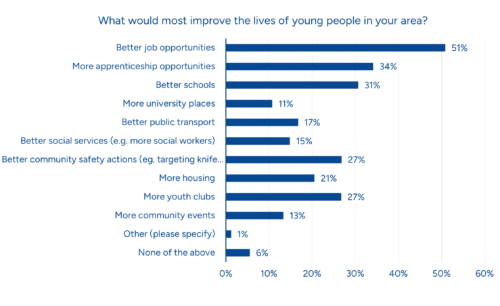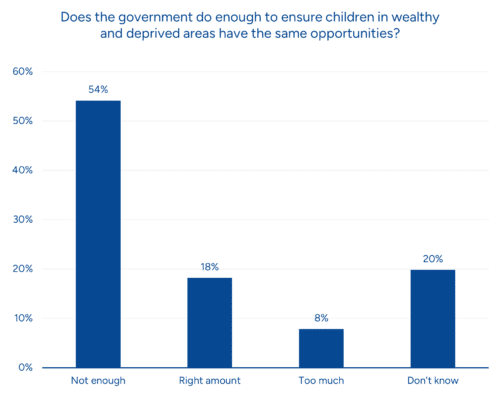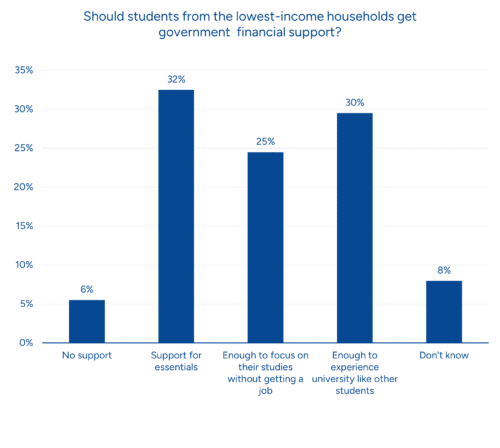Alumni
There are just a few short weeks to go before the UK’s next General Election.
Ahead of the country’s decision, we take a look at the British public’s views on social mobility – the relationship between the background someone grows up in, and where they end up themselves – both socially and economically.
Politicians across the political spectrum have looked at these issue for decades, whether through the lens of ‘levelling up’, ‘opportunity’, or terms like ‘social justice’, ‘equity’ or ‘the ladder of opportunity’. In the end. Whatever the term used, in the end much of it comes down to social mobility – the idea that someone’s background shouldn’t determine their chances in life.
This research, commissioned by the Sutton Trust and carried out by More in Common, looks at Britain’s views on social mobility today. Do the public think opportunities are spread equally for people from different backgrounds, and if not, do they want to see action from government?
How do British voters feel about social mobility?
Most of the public (71%) believe not all young people have the same opportunity to succeed – a view held consistently across different groups in society – with a substantial majority saying children from richer families enjoy better opportunities in schools (62%), universities (62%), pre-school education (59%) and jobs (54%), rising further in jobs like accountancy, law or medicine (61%).
83% of those surveyed, cutting across groups from different social and economic backgrounds, think there is a big class gap in Britain today, with 63% saying it is bigger or the same as 50 years ago.
50% of young people (18-24 year olds) think it is harder to move from working class to middle class today and 57% of young people think it is harder for young people to succeed today than it was for older generations.
67% of respondents agreed that it is unfair that some young people have access to a better education than others.
While 51% said that better job opportunities and 34% more apprenticeships would most improve the lives of local young people, 52% saw a lack of job opportunities for them in their area.
Time for action
The British public want fairer opportunities – with 93% saying it is important to make sure every young person has equal opportunities regardless of their background, and 87% saying it’s important to level the playing field. These were views held across different sections of society. Although there were understandably different opinions about specific issues and situations, these broad positions on equality in society were held across all sections of the public, regardless of age, ethnicity, gender, social classes, regions and even political views.
This commitment was, for many, backed up by economic reasoning, 79% thought everyone having access to a good education is important for growing the economy. Other popular reasons included making communities safer by reducing crime (66%), the fact that it was simply unfair for some to have access to better education than others (67%) and that it would help reduce inequality within the country (60%).
Are the public optimistic about change?
Most of those surveyed said it is the government’s place to ensure everyone has equal access to educational (81%) and job (69%) opportunities.
However, most respondents also felt government does not do enough to ensure that richer and poorer children have the same opportunities within the same school (55%) nor to ensure children in schools in wealthy and deprived areas have the same opportunities (54%).
What policies does Britain back?
Over half (52%) thought access to pre-school or nursery education should be free, just like school.
Nearly a third (31%) of respondents thought that better schools would be the best way to improve the lives of young people in their area and a similar proportion (29%) saw lack of access to good education as one of the main barriers to succeeding in life.
87% of respondents thought university students from low-income backgrounds should receive financial support and over half (53%) said such support should be in the form of grants rather than loans (30%).
The survey also found that a good education improved people’s sense of optimism about themselves and others like them. Three in four people who went to university said that people like them have a good chance of succeeding in life, but only half as many people without GCSEs would say the same.
Moving forward
Amongst the British public, there is a widespread recognition of the difficulties in, and yet importance of equalising opportunities and promoting social mobility – from nursery right the way through to university and job opportunities.
The importance of these issues is why the Sutton Trust is calling for present and future governments to expand free early years education to the most disadvantaged families in society, to seriously address the attainment gap in education and to introduce a more progressive higher education funding system.
These alone will not solve problems of inequality in society, but they would go a long way to levelling the playing field in a system where the most disadvantaged are so often having to run uphill. Also released today, in Fair Opportunity for All, The Sutton Trust offers a costed road map of policy recommendations that could, at the very least, start to reduce the gradient of that hill.



